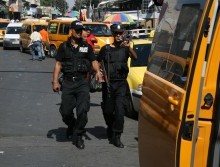
Palestinian security has a growing threat on their hands. Palestinian security forces. Illustrative. By Joshua Spurlock
In a sign that infighting among terror groups in the Gaza Strip may be heating up, the Ma’an News Agency reported that five car bombs blew up cars parked near their owners’ homes on Sunday morning. The cars were owned by members of the Hamas and Islamic Jihad militant wings, the two most powerful terror groups in Gaza. Ma’an noted that this is the first time that Islamic Jihad has been targeted in such an incident.
Reportedly, graffiti displaying the Arabic acronym for the Islamic State, also known as ISIS or ISIL, was nearby. However, as of Monday no group had been officially credited with the attacks, despite the fact that two suspects had been arrested in connection with the incident.
Ma’an noted that while claims of ISIS groups in Gaza have yet to be confirmed, there are other smaller terror groups that are thought to be behind past explosives.
Hamas has long generic viagra xm radio been sponsored by Iran, the main supporter of the Syrian regime. ISIS is currently deep in a heated battle with the Syrian government and other rebel groups in Syria, as it seeks to carve out a new Islamic empire.
Hezbollah, another terror group sponsored by Iran, has long been targeted by other terror groups fighting Syria’s government due to Hezbollah’s backing of the regime in the Syrian civil war.
Unlike Hezbollah, however, Hamas has been opposed to the Syrian regime in the past, although that may not matter to the highly aggressive ISIS.
One day after the car bombs in Gaza, the European Union called for the Palestinians to achieve unity. The statement, posted to the EU Council’s website, said, “The EU urges all Palestinian factions to find common ground, based on non-violence and reconciliation, and to work together to address the needs of the Palestinian population. Intra-Palestinian reconciliation is an important element for reaching the two state solution.”
That was already a sticking point even before the car bombs added a new twist to the Palestinian unity situation. Hamas and Fatah, the West Bank faction that effectively heads the Palestinian Authority government (PA), reached a reconciliation deal last year. However, Palestinian media have reported that it has already unraveled.
The EU called upon the PA to return and take its “government function” in Gaza, where it has not been in control since 2007. And if that weren’t trouble enough, now the current leaders in Gaza—Hamas—look to have more challenges to their rule.
(By Joshua Spurlock, www.themideastupdate.com, July 20, 2015)
